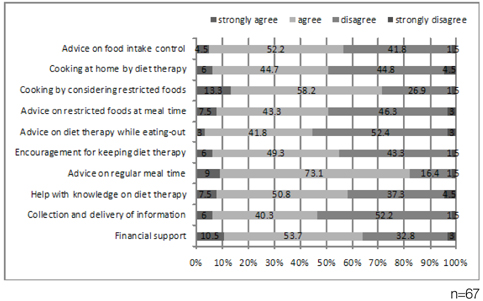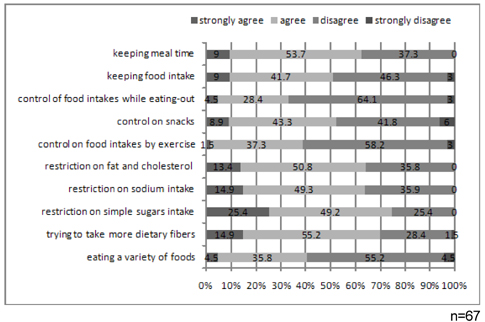Nutr Res Pract.
2009 Jun;3(2):141-148.
Relationships of family support, diet therapy practice and blood glucose control in typeII diabetic patients
- Affiliations
-
- 1Department of Food & Nutrition, Chungbuk National University, 410 Seongbong-ro, Heongduk-gu, Cheongju 361-763, Korea. knkim@chungbuk.ac.kr
Abstract
- The purpose of this study was to investigate the degree of family support for diabetic patients and the diet therapy practice of patients themselves, and to analyze the relationship between family support and diet therapy practice and blood glucose control, and thus to prepare basic data for the development of effective education programs to improve blood glucose control in diabetic patients. The study subjects were 82 patients with type II diabetes, aged over 20 in the Chungbuk area. The gender distribution of subjects was 52.4% males and 47.6% females, and BMI showed 29.3% overweight and 35.3% obesity. Among the 82 study subjects, the relationship between diet therapy related family support and blood glucose control was examined in 67 subjects who answered practicing diet therapy, and the results showed that the family support score of a group with excellent blood glucose control was significantly higher than those of groups with fair or poor control (p<0.001) and the correlation between the two factors was very high (r=0.341, p<0.001). For the relationship between diet therapy practice by patients themselves and blood glucose control, diet therapy practice of a group with excellent blood glucose control was significantly higher than those of other groups (fair or poor control groups) (p<0.001) and the correlation between two factors was very high (r=0.304, p<0.001). For other factors influencing blood glucose control, a group with diabetes education showed significantly better blood glucose control compared to other groups without education (p<0.05). From the above results, diet therapy practice by patients, family support, and the necessity of diabetes education were confirmed to control blood glucose of diabetic patients. In conclusion, development and operation of education program should include not only patients but also their family members.
Figure
Reference
-
1. Cha HS. A study on the family function characteristics of diabetes mellitus patients. 2004. Seoul. Republic of Korea: Seoul Women's University;Ms Thesis.2. Cho YI, Jun HY, Lee JE, Lee YH. The relationship between the perceived family Support, self-efficacy, and health promoting life style with diabetes mellitus. Research Journal of Dongnam Health College. 2003. 2:65–79. Seoul. Republic of Korea.3. Choi JE. A study on the related factors in diabetic patients. 2001. Seoul. Republic of Korea: Youngnam University;Ms Thesis.4. Cole I, Chesla CA. Interventions for the family with diabetes. Nurs Clin North Am. 2006. 41:625–639.
Article5. Gill GS. Study on the knowledge, perceived seriousness and adherence to preventive behavior on chronic complication of diabetes mellitus. 2004. Seoul. Republic of Korea: Pusan National University;Ms Thesis.6. Jang SM. A study on family function being effected to self-care of diabetic patients. Korean Journal of Family Welfare. 1999. 4:243–263.7. Jeong HY, Kim YK, Yang JH, Jeong SM, Kim YK. The patterns of response of blood glucose to NPH injection in korean diabetics. Kor J Internal Med. 1985. 28:328–332.8. Kan CF. Family social support toward a conceptual model. ANS Adv Nurs Sci. 1988. 2:18–25.9. Kang BI. The relationships among diabetes knowledge, family support, self-efficiency and self-care behavior. 2002. Seoul. Republic of Korea: Soonchunhyang University;Ms Thesis.10. Kang MJ, Kim SY, Park SY, Park CH, Sung JY, Shin MA, Ha JY, Whang EH, Choi YH. Family support perceived by diabetic patients in diet therapy practice. Journal of Korean Ewha Nursing Science. 1995. 28:40–51.11. Kaplan BH, Cassel JC, Gore S. Social support and health. Med Care. 1977. 15:47–58.
Article12. Kim ES, Lee SJ, Ryu OH, Lee JY, Yun HS, Choi MG. The relationship of family support with blood glucose control in elderly type 2 diabetic patients. The Journal of Korean Diabetes Association. 2007. 31:435–443.
Article13. Kim JH. Effect of nutrition education on knowledge, attitude and behavior about dietary therapy and blood glucose control in type II diabetic patients. 2002. Seoul. Republic of Korea: Keimyung University;Ms Thesis.14. Kim TY. The effects of social support on compliance to dietary regimen with noninsulin dependent diabetes mellitus. 1999. Seoul. Republic of Korea: Dongguk University;Ms Thesis.15. Report on 2007 The fourth Korea National Health & Nutrition Examination Survey. Korea Centers for Disease Control (KCDC). 2009. Accessed on 3/25/2009. http://www.knhanes.cdc.go.kr.16. 2003 Statistical results about cause of death. Korea National Statistical Office. 2006. Accessed on 8/20/2006. http://www.idf.org.17. Medicinal substances for diabetes treatment. Korea Technology Transfer Center. 2006. Accessed on 1/20/2008. http://www.kttc.or.kr.18. Korean Society for the Study of Obesity. Report on cut-off point of body mass index and waist circumference for criteria of obesity and abdominal obesity among Korean. 2005. Seoul. Republic of Korea: 2–3.19. Lee KJ. Study on the correlation between the family functioning and the compliance with sick role behavior of diabetic mellitus patients. 1987. Seoul. Republic of Korea: Ewha Woman's University;Ms Thesis.20. Lee SL, Kim YL, Lee SJ, Cho YK, Choi YK, Chun CH, Chang YK. Effects of diabetes education on diabetic management in non-insulin-dependent diabetics mellitus patients. Journal of the Korean Dietetic Association. 2004. 10:300–308.21. Lee SL, Lee SS. Effect of nutrition counseling on diabetic for patients with Type II diabetics. Korean Living Science Research. 2007. 27:35–40.22. Lee YG. A study of the relationship among diabetes knowledge, family support, and self-care behavior in diabetes. 2000. Seoul. Republic of Korea: Korea University;Ms Thesis.23. Moon YJ. The effects of family education on type 2 diabetic patients' self-care behavior and perception of family support. 2004. Seoul. Republic of Korea: Yonsei University;Ms Thesis.24. Park CO, Baik HY, Lee HK, Min HK. The effect of knowledge and dietary compliance on diabetic control in non-insulin dependent diabetics. The Journal of Korean Diabetes Association. 1988. 12:79–88.25. Park OJ. The effect of Social support on Compliance with Sick-Role Behavior in diabetic patients. 1984. Seoul. Republic of Korea: Yonsei University;Dr Thesis.26. Park MS. A study of the relationship between family support and Quality of life of type II diabetes. 2000. Seoul. Republic of Korea: Kyung Hee University;Ms Thesis.27. Yoo MS. A study of the relationship between the dietetic knowledge of the patients and his family, family support perceived by the patients and compliance with diet therapy in diabetes. 1988. Seoul. Republic of Korea: Yonsei University;Ms Thesis.
- Full Text Links
- Actions
-
Cited
- CITED
-
- Close
- Share
- Similar articles
-
- Diet Therapy in Patients of Diabetic Nephropathy
- Self-Care of Diabetic Nephropathy
- The Relationship of Family Support with Blood Glucose Control in Elderly Type 2 Diabetic Patients
- A Study on Diet Education of Participants in Diabetic Education at Public Health Center
- Self-care, Family Support and Depression in Elderly Patients with Diabetes Mellitus



